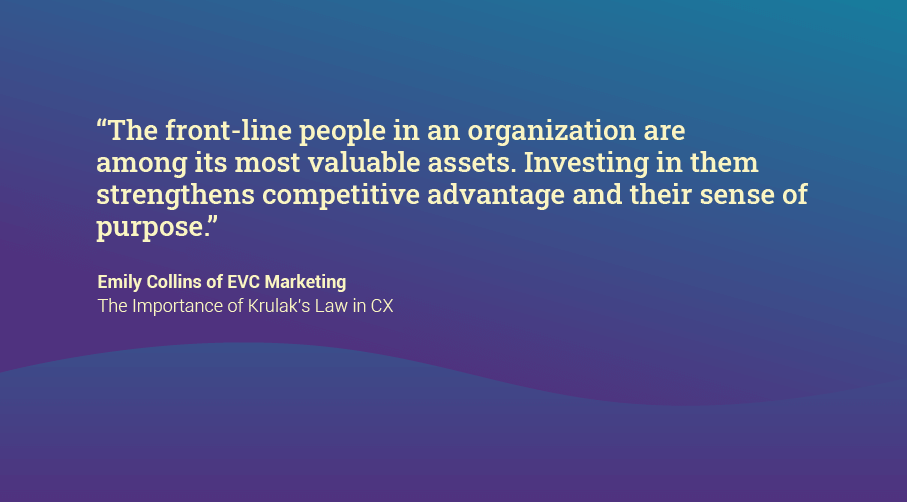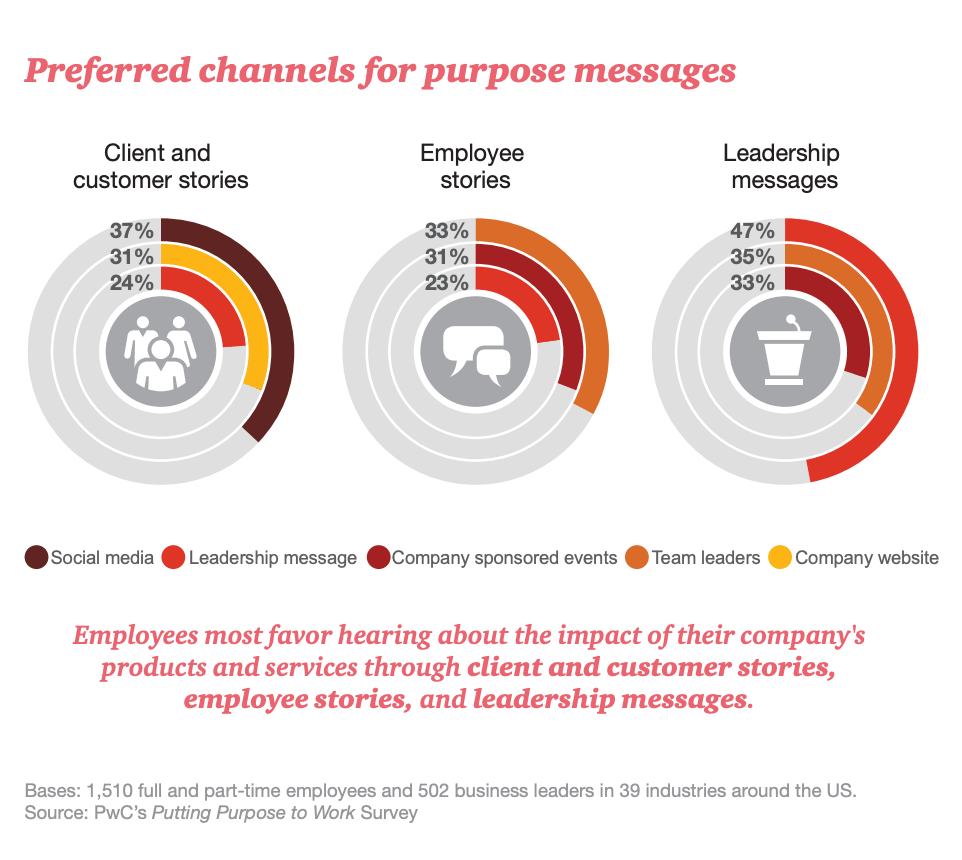
How to Build Purpose into the Role of Each Call Center Agent So Your Customer Service Team Isn’t Stuck Daydreaming About Hating Their Job
Finding purpose in your work matters in every profession. In fact, 83% of people say finding meaning in their day-to-day work is a top priority in their role. And once employees realize their purpose, productivity peaks.
For a call center agent, though, it’s often tough to see how handling back-to-back interactions all day fits into the larger picture. A doctor’s purpose is to give outstanding medical care. Sometimes life-saving care. A social worker’s purpose is to help children find safe homes and support systems. It’s easy for people in these roles to understand how they’re contributing.
But, what does your call center agent see as their purpose?
More often than not, your agents struggle to find meaning in their work. They see themselves as a way to trim budgets and act as a company scapegoat. They get berated by angry customers hiding behind the disguise of a phone or keyboard, they apologize for issues that aren’t their fault, and they work toward unattainable KPIs in the name of driving efficiencies and shaving costs.
[Download Now] Help your agents find purpose with 52 questions to ask in 1:1s
It’s easy to see that the job of a call center agent isn’t glorified. What’s more? It’s hardly appreciated. But it needs to be. Your agents help people. And, turns out, helping your agents find purpose at work brings higher returns than running your contact center like an assembly line.
Using job satisfaction-to-productivity ratios, Harvard researcher Shawn Achor estimated that highly meaningful work will generate an additional $9,078 per worker, per year.
Putting pride and reward back into the contact center.
Despite how typical call center agents feel, their work is vital to the success of many businesses.
Your customer service team is responsible for saving broken customer relationships and nurturing customers into loyal brand advocates. They’re the first point of contact for unhappy customers, and a friendly conversation with an agent is the number one reason people trust your brand. They’re tasked with a tough job, and they handle it like champs. Too many agents are stuck loathing their line of work, and that stems from lack of purpose and appreciation for all they do.
“No one wants to be a nine-to-five robot. People want to feel inspired, find meaning, and see the impact their work has on others. And when they do, they’re more engaged, innovative, and productive. That isn’t a secret or a revelation. It’s common sense.”
It’s up to you, manager, to help your agents understand their impact and the big-picture beyond their role. Creating purpose needs to be rooted into your culture, not a one-time fling. If not, the intention will feel inauthentic and have the opposite effect of what you hoped for.
So today, we’re walking through four ways to help your agents find daily purpose at work.
What’s in a name? A lot, apparently.
While we want to brush job titles off as just words, turns out they do matter – a lot. Research found that job titles can improve our well-being. They also give us a sense of purpose and help others show outward appreciation when asking “What do you do for a living?”
One experiment in title shifts came from the former CEO of Make-A-Wish Foundation. She allowed employees to create their own job titles. There were few restrictions and many chose playful titles like “Fairy Godmother of Wishes.”
Researchers from the University of Pennsylvania and the London Business School surveyed these employees a little over a year after the title changes, and found that the new “fun” job titles “reduced workers’ emotional exhaustion, helped them cope with emotional challenges, and let them affirm their identity at work.”
[Read Next] Building a case for the Customer Happiness Agent
This isn’t to say you have to allow your agents to choose their own titles, nor do you have to give them “fun” titles. However, think up alternate titles that positively reflect their role in your company.
Companies like Buffer, known for their stellar service, use titles like Happiness Heroes and Community Champions to name their agents. And, more companies are adopting the Customer Happiness Agent title, too. It makes agents feel more empowered, and it defines their larger purpose, hitching it right to their name.
In addition, a study from the University of North Carolina found that higher titles don’t have to be paired with higher salaries, nor more responsibility to have a morale-boosting effect. The perceived value to the company is more impactful than a bigger paycheck.
Remind your agents that they make a difference.
Every so often, an agent handles an interaction flawlessly and manages to turn an unhappy customer into a brand ambassador.
Don’t let these little moments go unnoticed. Recognize your agents for their hard work and effort. Highlight stories in team meetings, create a monthly newsletter, or even send out a fast email at the end of each week to share positive customer feedback.
A study on purpose in the workplace by PWC found that employees like to hear about their impact through customer stories, employee stories and messages from their leadership team.
Get specific with the feedback you share and loop in customer quotes, peer feedback and praise from leadership when possible, too. Let your agents know their impact extends beyond their desktop and impacts real lives and larger business goals. The more agents are aware of the good going on around them, the more pride they’ll have in what they do and the company they work for.
Reward effort and recognize progress.
Your team has tough goals to hit. And like every team, sometimes they miss a KPI. But that doesn’t mean they deserve a slap on the wrist every time. Reward your agents’ effort and the progress they make toward their goals. If they were just shy of an important KPI, but made substantial gains compared to last month, point this out to your supervisors and in 1:1s.
“It doesn’t matter what line of work you’re in. If people see the cause and effect between their inputs and their team’s progress, or understand the impact of a customer getting their product on time, or experience first-hand how their role is necessary to other people, they’ll feel a sense of purpose.”
And, show your support with coaching and training, too. Work with your agents to inch closer to meeting their metrics. Give specific and actionable feedback to help agents understand where to improve.
It’s important to measure progress and celebrate the small wins along the way. Then, your team will be encouraged to keep putting in the hard work and reach their goals.
[Read Next] Celebrate micro wins to keep employees engaged
Ramp up training and coaching to keep your team engaged.
Want a sure way to make your team feel valued? Spend time coaching and training so you can help your agents progress their careers. Agents who don’t feel valued, understand their purpose, or see a future with their company will leave. Gartner found that a lack of career progression and skill advancement is the number one factor driving employee attrition.
Tenured agents are your most valuable assets. So, treat them that way. Ramp up agent training and coaching to keep your agents planted in their seats.

When you take time to grow every call center agent, they know their worth. They understand their value to your organization and they feel pride in a job well-done. From setting up mentorship programs to prioritizing career pathing and more effective 1:1s, investing in your people pays off in lower attrition, higher productivity, and pride in their roles.
[Download Now] Help your agents find purpose with 52 questions to ask in 1:1s
We originally published this post on October 24, 2017 and updated it for new insight on December 10, 2020.


